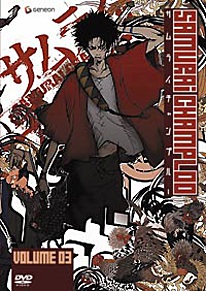Review
by Carlo Santos,Samurai Champloo
DVD 3
| Synopsis: |  |
||
Fuu and her samurai companions Mugen and Jin continue their search for the sunflower samurai, all the while trying to find new sources of income. An attempt to cross a heavily guarded military checkpoint turns into a high spiritual experience for everyone; once they get to the next town, Mugen plays cat-and-mouse with a serial killer who relishes the challenge of fighting the top swordsmen in the land. Later on, Jin becomes infatuated with a prostitute who has sold herself to repay her husband's debts, while Mugen tries to strike it rich with beetle sumo wrestling. Are they ever going to get back on track with the sunflower samurai? Maybe the guys will find out more about him when they stumble upon Fuu's secret diary. |
|||
| Review: | |||
As far as historical anime shows go, few are as entertaining as Samurai Champloo, and that's probably because it generally avoids being historical. Despite its 19th-century trappings, Champloo boasts an eclectic visual style and an anachronistic soundtrack that catapults it into modern-day relevance. This quartet of episodes showcases the wide range of moods and stories that this anime is capable of, all tied together by the search for more money, and the sunflower samurai. The structure of the series retains its consistency through Volume 3, telling stand-alone stories that are linked by the trio's ongoing journey. The pattern is broken momentarily in Episode 12 for a clip episode that summarizes the series so far. Although it's a fun way of reliving events through Fuu's eyes, it's also a cheap excuse to get out of producing fresh animation and story. The other episodes are more fulfilling: on a single disc we have a perilous caper with an unexpected ending, some classic sword-fighting action, and a strange but touching love story. The telling of these stories is often straightforward, shifting effortlessly between weighty drama and nimble action, yet the next turn is always an interesting one, just like the series itself. One particular high point is in Episode 11, where Jin gets involved with a prostitute and gallantly tries to save her from the brothel. For the first time, his character goes beyond that of "the quiet guy" and we see his unwavering sense of justice at work. The ending is particularly moving, showing at once the depth of his heart but also reminding us that he's still just a quiet guy with a sword. Meanwhile, the serious side of Mugen's code of conduct comes to light in the previous episode, but it's not quite as dramatic as what happens to Jin. Through all this, Fuu bounces merrily and nags the other two to make some money; clearly, this isn't her time for character development. The artwork of Samurai Champloo remains as stylish as ever, combining lush, idyllic landscapes with bold, angular character art. Although overt references to hip-hop culture are put on hold for a while, there's still plenty of room for the animators to have fun, such as in the colorful, tripped-out sequence towards the end of Episode 9. (Anyone who's seen "Mind Game" should recognize the style immediately as that of the movie director Masaaki Yuasa.) A more subtle technique shows up in flashbacks, where sepia tones and grainy effects give the right feeling of age to certain scenes. When bigger jumps in time are required—like the policeman narrator making ridiculous historical tangents—whole shifts in style come into play, making references to ukiyo-e, the Beat generation, and even modern-day Japan. Of course, more conventional animation techniques retain their high standard as well, and there really is no swordfight like a Champloo swordfight. With real-time action, extreme perspectives and angles, and unpredictable moves, this is one truly vivid (if rather stylized) depiction of the samurai era. The soundtrack remains just as distinctive as the visuals, with hip-hop tracks encompassing a wide range of emotions. Whether it be a single instrument unraveling a melody, or an all-out breakdown on a heavy beat, this is a style of music that's easily as expressive as any full orchestra. Watch out also for the alternate ending song in Episode 12, a soulful ballad whose dramatic weight balances the comedic mood of that episode. Even if it's not everyone's favorite genre, the music suits itself very well to the series, and that's what matters. Bang Zoom! continues their solid dubbing work on this series, giving Jin, Mugen and Fuu their own unique English-speaking personalities. The one point that could use improvement is putting more energy and emotion into them, as the characters sound surprisingly composed at times compared to their Japanese counterparts. The audio also clips a bit when people are shouting, dampening the effect of the voice actors going all out. The translations aren't totally faithful, but the colloquialisms and phrasing that they use in English often do a fine job of capturing the dialogue's essence. (Interestingly, Mugen swears more often in English than he does in Japanese.) People often speak of the code of the samurai, but what is it really? Watch Samurai Champloo and you'll learn... nothing of the sort, except for a whole lot of distorted historical information. But what you will learn is a whole lot about human nature, refracted through the unique filter of historical drama and modern urban music. Courage, fear, love, and laughter all play a part in these next few episodes, proving that it isn't just a carefree road trip, but one that can change people for life. |
| Grade: | |||
|
Overall (dub) : B+
Overall (sub) : A-
Story : B-
Animation : A
Art : A
Music : A-
+ Full of emotional depth and striking animation techniques. |
|||
| discuss this in the forum (3 posts) | | |||
| Production Info: | ||
|
Full encyclopedia details about Release information about |
||